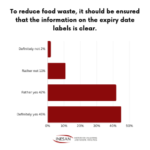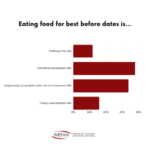
Etikety s datem spotřeby – priorita politiky
26. 11. 2023
Flexibility with ‘Best Before’
3. 12. 2023The survey results reveal a cautious consumer attitude towards ‘best before’ dates, with only 12% feeling comfortable consuming food after these dates. This caution, while beneficial in avoiding potential quality issues, could contribute to unnecessary food waste. The ‘best before’ date, unlike the ‘use by’ date, relates to the quality rather than the safety of the food. However, many consumers seem to equate it with a safety warning, leading to the discarding of food that is still safe and often perfectly edible.
There is a need for policy interventions in food labeling standards. This could include clearer definitions and guidelines for “best before” dates to ensure that they are based on realistic assessments of food quality over time. This demand goes beyond mere consumer preference; it reflects a growing awareness of the environmental and economic impact of food waste. Retailers and food manufacturers can also play a critical role by adopting more intuitive labeling practices and educating consumers at the point of sale. Accurate and understandable expiration date information can significantly influence consumer behavior and lead to more informed and responsible purchasing and consumption decisions.
For more information about this issue see
https://bit.ly/How_does_packaging_help_consumers_to_reduce_the_quantity_of_food_waste
and
https://bit.ly/Vybrane_postojove_determinanty_predchazeni_vzniku_potravinoveho_odpadu





